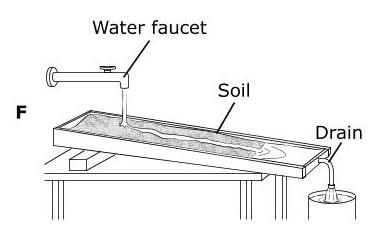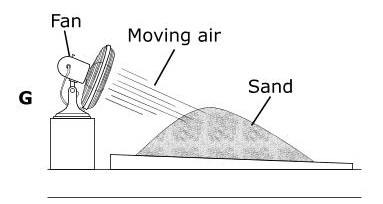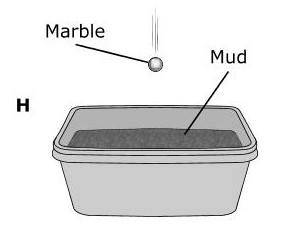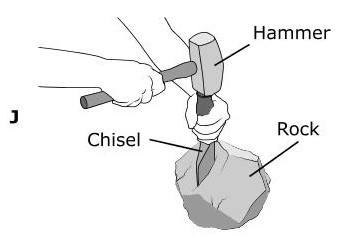
(R) 3.7B/5.7B Science STAAR (Rapid/Slow Changes--Landforms)
Authored by Bethany Hardy
Other Sciences
5th Grade
Used 381+ times

AI Actions
Add similar questions
Adjust reading levels
Convert to real-world scenario
Translate activity
More...
Content View
Student View
12 questions
Show all answers
1.
MULTIPLE CHOICE QUESTION
5 mins • 1 pt
Glaciers are masses of ice that move slowly on land. Which of these features was most likely formed by a glacier? (5.7B)
A wide valley
A deep ocean
A lava flow
A mountain range
2.
MULTIPLE CHOICE QUESTION
5 mins • 1 pt

The Rio Grande Valley is located at the southern tip of Texas at the end of a long river known as the Rio Grande. How did the delta at the end of the Rio Grande form? (5.7B)
Sand and mud from the Gulf of Mexico were washed ashore by tsunamis.
The river cut through the solid bedrock of the valley.
The river deposited large amounts of sediment from land erosion.
Hurricanes pushed soil and debris from the Gulf of Mexico onto the land.
3.
MULTIPLE CHOICE QUESTION
5 mins • 1 pt
A student hiking in a rocky area on a mountain notices that wide, deep cracks have formed in some of the large rocks. Some of the cracks are so large that the rocks have broken apart. Which process most likely caused these rocks to crack and break? (5.7B)
Erosion by wind
Water freezing and thawing
Erosion by fast-moving water
Sediments being deposited
4.
MULTIPLE CHOICE QUESTION
5 mins • 1 pt

The photograph shows a canyon in northern Arizona. Which of these describes how this canyon was most likely formed? (5.7B)
Floods eroded the sandstone away from the canyon walls.
Glaciers eroded the canyon rock as they melted and moved.
Ice wedged into cracks in the rock and weathered the canyon walls.
Wind blew large rocks that smashed against the canyon walls.
5.
MULTIPLE CHOICE QUESTION
5 mins • 1 pt

A wide U-shaped valley is shown in the photograph. This valley was most likely formed by-- (5.7B)
flash flooding
a glacier
a hurricane
melting snow
6.
MULTIPLE CHOICE QUESTION
5 mins • 1 pt

Students constructed this model of a hill covering sugar cubes with clay. The students placed the model in a large pan and poured hot water over it every day for a week. What does this model best represent? (5.7B)
A method for removing fossil fuels from hills
The formation caves in hills
The formation of plains
A method for separating minerals
7.
MULTIPLE CHOICE QUESTION
5 mins • 1 pt

Monahans Sandhills State Park in Texas has almost 4,000 acres of sand dunes. Some of the dunes are as tall as a six-story building. The dune in the park are formed by-- (5.7B)
rainstorms
tornadoes
earthquakes
strong winds
Access all questions and much more by creating a free account
Create resources
Host any resource
Get auto-graded reports

Continue with Google

Continue with Email

Continue with Classlink

Continue with Clever
or continue with

Microsoft
%20(1).png)
Apple
Others
Already have an account?
Similar Resources on Wayground

13 questions
Climate Action Challenge Quiz
Quiz
•
1st - 6th Grade

12 questions
How are canyon walls formed?
Quiz
•
5th Grade

10 questions
INTERVALOS
Quiz
•
KG - University

10 questions
Sains Ting 2 :Tekanan Udara
Quiz
•
KG - 12th Grade

10 questions
Our solar system
Quiz
•
2nd - 5th Grade

15 questions
HS 1-Sensory System
Quiz
•
KG - University

13 questions
Magnetism
Quiz
•
3rd - 5th Grade

12 questions
Alternative Energy Resources
Quiz
•
5th Grade
Popular Resources on Wayground

15 questions
Fractions on a Number Line
Quiz
•
3rd Grade

20 questions
Equivalent Fractions
Quiz
•
3rd Grade

25 questions
Multiplication Facts
Quiz
•
5th Grade

22 questions
fractions
Quiz
•
3rd Grade

20 questions
Main Idea and Details
Quiz
•
5th Grade

20 questions
Context Clues
Quiz
•
6th Grade

15 questions
Equivalent Fractions
Quiz
•
4th Grade

20 questions
Figurative Language Review
Quiz
•
6th Grade
Discover more resources for Other Sciences

20 questions
Natural Selection, Adaptation, and Evolution
Quiz
•
5th - 8th Grade

12 questions
What On Earth
Quiz
•
4th - 8th Grade

15 questions
5th grade science STAAR review
Quiz
•
5th Grade

10 questions
Four Spheres, (Geo and Bio)
Quiz
•
4th - 8th Grade

14 questions
Weather In Space
Quiz
•
4th - 8th Grade

20 questions
Weather and Climate
Quiz
•
5th - 8th Grade

20 questions
Magnetism
Quiz
•
5th Grade

34 questions
FOSS Water and Climate: Investigations 3 & 4
Quiz
•
3rd - 5th Grade





